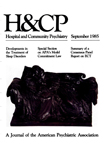APA's Model Law: Hurting the People It Seeks to Help
Abstract
In the view of some patient advocates, APA's model law excessively increases psychiatrists' decision-making power in commitment proceedings and heightens the chances of unnecessary commitments by expanding grounds for commitment to include a substantial-deterioration standard, incorporating open-ended commitment criteria, and removing legal safeguards. The model law's encouragement of hospitalization is inconsistent with growing evidence that many patients do not benefit from hospitalization and obscures the need for greater resources for community care. Finally, by granting legal immunity to professionals, the law undercuts its professed desire to protect patients.
Access content
To read the fulltext, please use one of the options below to sign in or purchase access.- Personal login
- Institutional Login
- Sign in via OpenAthens
- Register for access
-
Please login/register if you wish to pair your device and check access availability.
Not a subscriber?
PsychiatryOnline subscription options offer access to the DSM-5 library, books, journals, CME, and patient resources. This all-in-one virtual library provides psychiatrists and mental health professionals with key resources for diagnosis, treatment, research, and professional development.
Need more help? PsychiatryOnline Customer Service may be reached by emailing [email protected] or by calling 800-368-5777 (in the U.S.) or 703-907-7322 (outside the U.S.).



